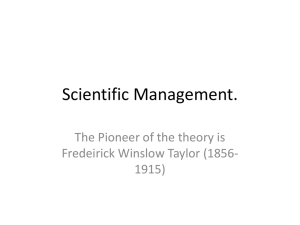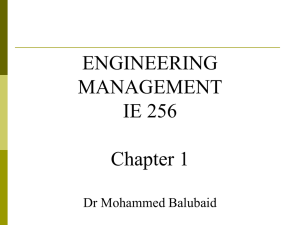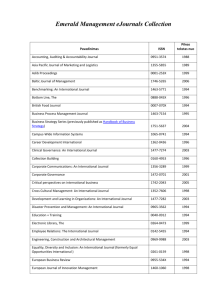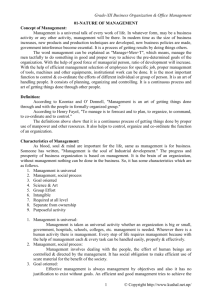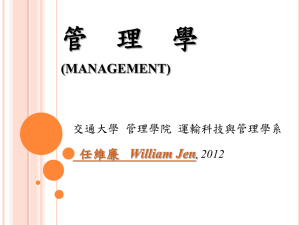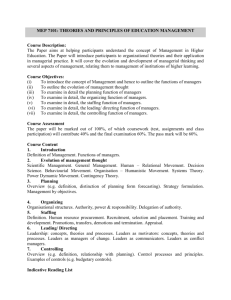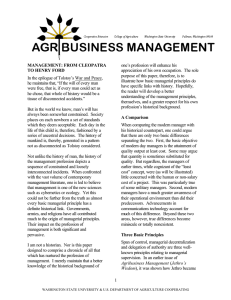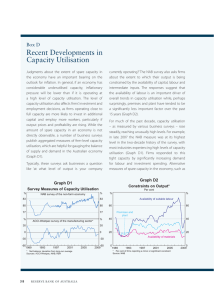Introduction of Management
advertisement
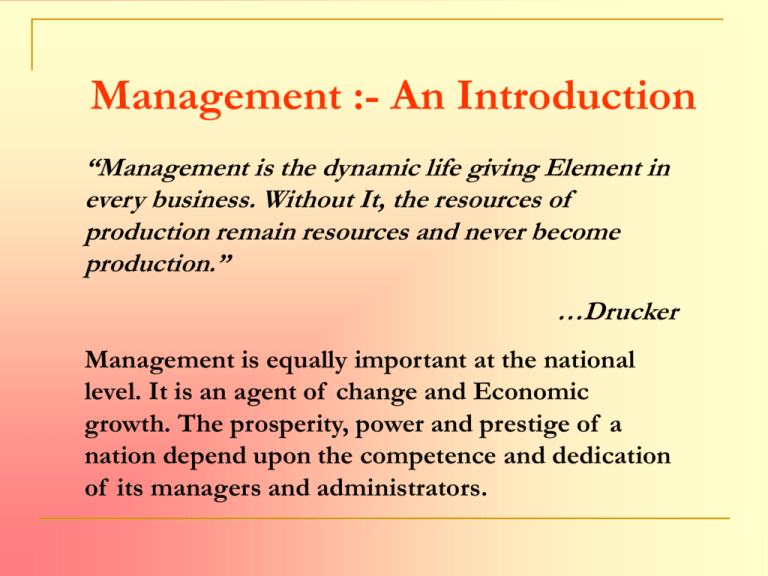
Management :- An Introduction “Management is the dynamic life giving Element in every business. Without It, the resources of production remain resources and never become production.” …Drucker Management is equally important at the national level. It is an agent of change and Economic growth. The prosperity, power and prestige of a nation depend upon the competence and dedication of its managers and administrators. Management is concerned with A. B. C. Increasing Efficiency Increasing Productivity & Reducing the Cost “Management entails the utilisation of human efforts and materials resources towards the achievement of organisational objectives”. … B M Richman II. Nature / Characteristics of Management: Management is a universal process Management is a purposeful Management is creative Management is a Group Phenomenon Management is a Social process Management is a multidisciplinary Management is a continuous process Management is intangible Management is both Science and Art Management is an integrative force III. Importance of Management:The significance of Management in the modern business world has increased tremendously due to the following challenges. 1. 2. 3. 4. 5. 6. 7. 8. Growing Size and Complexity of business Increasing specialization of work Cut-threat competition in the market Sophisticated and capital intensive technology Increasing complexity of of business decisions Need for Environment of business Need for reconciling the Interest of various groups e.g. Owners, Workers, customers and the Public Need for optimum utilisation of Scare resources Management – Art, Science or Profession Management as a Science Science is a systematized body of knowledge pertaining to particular field of enquiry. Which contains - Concepts - Hypothesis - Theories - Principles to Explain Cause - Effective relationship between two or more factors In order to be organised as a science, a discipline should have the following characteristics. A. B. C. D. E. Systematized body of knowledge Scientific Observations Experimentation Verifiable principles Universal Application However, Management is not perfect science like other physical science such as astronomy Physics, Chemistry, Biology etc. Management as an Art or Practice Art signifies the application of knowledge and personal skills to bring about desired results. It is based on scientific knowledge and principles. An art has the following features - (i) Body of Knowledge (ii) Personalised Application of Knowledge and Skills (iii) Practice (iv) Creativity Management as a Profession The term profession may be defined as a occupation backed by specialised body of knowledge and training and to which entry is regulated by a respective body. The essential requirements of a profession are as follows1. 2. 3. 4. 5. 6. Specialised field of knowledge Restricted entry based on Education and training Representative or professional Association Ethical code of conduct for self regulation. Social recognition Professional fee Management V/s Administration 1. 2. Administration is concerned with laying down objectives of the enterprise, formulating its polices, determining the broad organisation structure and overall control of the undertaking. The debate over the use of the above terms has given rise to three viewpoints: American viewpoint: Administration a high level function whereas Management is a lower level functions. British viewpoint: Management is a generic term and includes administration. 3. Modern viewpoint: Both the terms are used interchangeably Top Management Middle Management Lower Management Principles of Management:- 1. 2. 3. 4. 5. 6. Principles of Management have been suggested to assert the managerial thinking and action. They are also applicable under different Economic systems of the world. H. Fayol suggested fourteen principles of Management which he found most frequently to apply in his work. The Principles are discussed below: Division of Work Authority and Responsibility Discipline Unity of demand Unity of Direction Subordination of Individual Interest to the General Interest 7. 8. 9. 10. 11. 12. 13. 14. Remuneration of personnel Centralisation Scalar chain Order Equity Stability of Tensure of personel Initiative Esprit de corps (Union is Strength) Scientific Management : F W Taylor is regarded as the father of Scientific Management. “Scientific Management is the substitution of exact scientific investigation and knowledge for the old individual Judgment or opinion in all matters to the work done in the shop” Scientific Management is a process of directing human efforts which employs scientific Methods for getting highest productivity. In short, Scientific Management involves (i) Scientific study and Analysis of work (ii) Scientific Selection and training of Employees (iii) Standardisation of Raw Materials, working condition and equipment Aims of Scientific Management:The aims of Scientific Management may be summarized as under: a) Increase production b) Quality control c) Cost reduction d) Elimination of wastes e) Right men for Right work f) Incentive wages Techniques of Scientific Management:The Mechanisms of Scientific Management suggested by F W Taylor are discussed below: 1. Scientific Test Setting 2. Work Study Method Study Motion Study Time Study Fatigue Study 3. 4. 5. 6. 7. Planning the Task Setting the wage Rate Standardisation of tools and equipments. Scientific Selection and Training of workers Specialisation of function Foremanship Principles of Scientific Management 1. Scientific Investigation in place of rule of Thumb Decisions and Methods. Scientific Selection and training of workers Cooperation between Management and Labour. Equal Division of Responsibility between Management & Labour Maximum output in place of Restricted output 2. 3. 4. 5. Management functions and Inter-relationship of Managerial functions:- Management is the process of utilisation of human and other resources for the accomplishment of organisational objectives. In practice, a manager performs all the Managerial Functions. Simultaneously to utilise labour, capital, materials, machines and methods effectively for producing goods and services required by the society. Managerial Process Functions of Management Managerial Functions I. To forecast Operating Functions I. Planning II. To organise II. Organising III. To give orders III. Staffing IV. To control IV. Directing V. Controlling 1) Planning :- It is a mental process requiring the use of intellectual faculties, fore sight and sound judgment. It involves the following steps:1) Determination of objectives 2) Forecasting of future trends 3) Formulation of policies and programmes 4) Preparation of schedules and procedures 5) Formulation of budgets 2) Organising :- The process of organisation involves the following steps :1) Identification of activitieis required for the achievement of objectives and implementation of plan. 2) Grouping of activities so as to create self Contained Jobs 3) Assignment of Jobs to Employees 4) Creation of authority – Responsibility relationship between superiors and the subordinates 3) Staffing or Human Resource Management :- Usually includes the following activities • Manpower planning to determine the number and the kinds of person required • Recruitment for attracting suitable persons to seek jobs in the enterprise • Placement and orientation of Employees • Performance appraisal of Employees • Compensation of Employees 4) Directing and leading :- It involves the following a) Leadership b) Communication c) Motivation d) Supervision 5) Controlling:- The control process concerts of the following steps a) Setting up of standards b) Measuring performance c) Comparing performance with standards d) Taking corrective action Interrelationship Between Managerial Function P la n n in g C o n t r o llin g D ir e c t in g O r g a n is in g S t a f f in g The functions of Management are interdependent and interrelated

